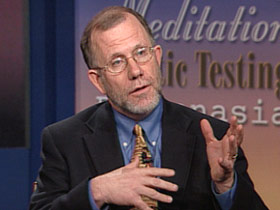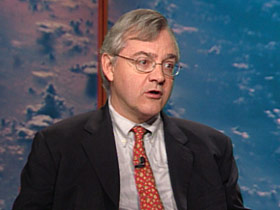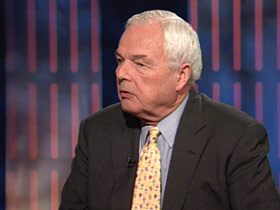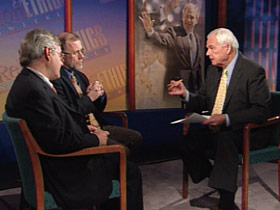In This Episode << SLIDE LEFT TO SEE ADDITIONAL SEGMENTS
Election 2004: Ethics of Foreign Policy
BOB ABERNETHY, anchor: Now, the first of three discussions this month on the moral principles underlying the major issues of the presidential campaign. E. J. Dionne is a columnist for THE WASHINGTON POST, a professor at Georgetown University, and a senior fellow at the Brookings Institution. Michael Cromartie is vice president of the Ethics and Public Policy Center in Washington and was recently appointed by President Bush to be a member of the U.S. Commission on International Religious Freedom. Welcome to you both.
First, briefly, in a few words: Michael, what did you make of this week’s debate?

MICHAEL CROMARTIE (Vice President, Ethics and Public Policy Center): Well, I think Senator Kerry wanted to prove to the American people that he was presidential, and he certainly did that. I think President Bush wanted to prove to the American people that he was a decisive leader — that he took firm stands and that there was no waffling on anything — and he did that.
ABERNETHY: E. J.?
E. J. DIONNE (Columnist, WASHINGTON POST and Senior Fellow, Brookings Institution): Yes, I think essentially, I agree with Mike, especially on the first half. I think Kerry was in control, was calm, and he spoke English in short sentences and not the past pluperfect subjunctive, which is good. I think President Bush had an off night. I think it showed that if you are in a cocoon and you’re not challenged a lot — you go to events only with your own people — there’s a certain kind of negative reaction. And that scowl of his, I think, will be remembered for a while.
ABERNETHY: The debate was about foreign policy. Let’s talk about that. Michael, what in your — how would you state the underlying moral purpose of American foreign policy? What should it be?
Mr. CROMARTIE: Well, it’s the purpose of the president of the United States, the head of the government, to protect the citizens of the United States. So national security is the issue that must underlie anybody who’s going to be the president of the United States. In other words, how best to protect the American people? Now, the disagreements come in how you make that happen in the world.
ABERNETHY: E. J.?

Mr. DIONNE: Except for pacifists who obviously, on principle, disapprove [of] the use of force anytime, I think most Americans agree that the use of force is legitimate to prevent violence against our country or against Americans. And I thought in that debate it was very clear that both candidates shared that moral value. I think there’s a second, more debated notion, which is it’s important for the United States, as the most powerful country in the world, to use force occasionally to protect people outside our borders. And I thought that was the other striking area of agreement in the debate on Darfur and genocide, where both candidates thought we, as a nation, have an obligation to do something about this.
ABERNETHY: And E. J., when is it right and when is it wrong to intervene militarily, as we did in Iraq?
Mr. DIONNE: Well again, I think the — most Americans believe that military intervention should be, as Kerry kept saying, “a last resort” and designed almost entirely to protect the people of United States, unless there is a calamity so severe that we end up with a moral obligation. And so I think Americans are reluctant interventionists, as a people. And I think that comes out whenever a war goes on for a little bit of a while, you see that in their guts Americans are reluctant interventionists.
Mr. CROMARTIE: And Bob, let me add to that that the “just war” theory had seven criteria. The most hotly disputed part of that criteria is the understanding of last resort. And as you remember, in the debate Senator Kerry kept saying, “I don’t think we went to last resort.” Honorable people disagree about when “last resort” is. You know, does it mean another UN Security Council resolution, does it mean another negotiation, more diplomacy? There’s always going to be a disagreement about when we reach last resort.

ABERNETHY: Is another fundamental moral idea that we should do everything we can to solve problems that have become violent or might soon become violent? I’m thinking of, for instance, the dispute between Israel and the Palestinians. Do we have a moral obligation to try to help solve that? Michael?
Mr. CROMARTIE: Well yeah, I think we do, because we have national security interests in that region, obviously. And the question is — as we all know, for decades American presidents have tried through diplomacy to bring resolution to that horrible conflict there.
ABERNETHY: How about humanitarian aid? Where there has been a disaster, certainly. But humanitarian aid generally, because people are needy? E. J.?
Mr. DIONNE: Well, you know the moral position in the United States is difficult because the United States is the most powerful country in the world. That’s kind of a paradox — our power should give us more opportunity. But it is precisely because we are powerful that on the one hand we are called in to help resolve disputes, such as the Israeli-Palestinian dispute, or to be more generous than we are in helping other countries in times of disaster. But that power creates certain obligations that a lot of Americans are worried about, and it also creates a fear that as the most powerful country in the world, there’s always the danger that we will abuse that power. And certainly there are others around the world who look at us that way. So the United States walks a very careful line, and sometimes we fall off the line and oftentimes, God willing, we don’t.

ABERNETHY: And in all this, to act by ourselves, to act with allies, to act only if the UN says it’s okay, Michael?
Mr. CROMARTIE: Inasmuch as possible, act with allies. Inasmuch as possible, act with the UN’s assistance. However, as the president keeps repeating, “I will not put American national interest and national security at stake, waiting for one more ally, one more resolution.” I think the candidates agree, inasmuch as possible — get as many allies as possible. They do disagree, however, how many is required before the U.S. interest is at stake in some region in the world.
Mr. DIONNE: I agree with that, but I think for most Americans the issue of allies is much more of a practical issue than a moral issue. Will we be more successful if we operate in concert with more people? And I think what you saw in the debate is much less a moral argument about the UN and the allies — a much more practical argument about what makes for success.
ABERNETHY: And in the debate, it was interesting, both candidates said the number one issue facing the president is the question of the spread of weapons of mass destruction, nuclear weapons especially. Do we have a moral obligation to try to prevent that spread?
Mr. CROMARTIE: Oh, absolutely. I mean, the whole earth is at stake, not only the United States, but the whole earth. I was a little surprised that they didn’t couch [it] a little more in terms of terrorism. I mean, they had been debating terrorism for an hour and 15 minutes at that point and then that came up. I think their point was, nuclear proliferation in the hands of terrorists probably concerns them the most.
ABERNETHY: E. J., quickly?
Mr. DIONNE: Well, I think that was implicit, is [that] what we are worried about [is] that material getting in the wrong hands. So that includes terrorists’ hands. It could also include small, hostile powers to us. I mean, it was interesting that that was one answer where Kerry was right out of the blocks. He knew what he wanted to say and he said it in two words. Now, I would have been interested if the order had been reversed, because I wonder how President Bush would have framed it.
ABERNETHY: Gentlemen, many thanks. Very helpful. E. J. Dionne and Michael Cromartie.

